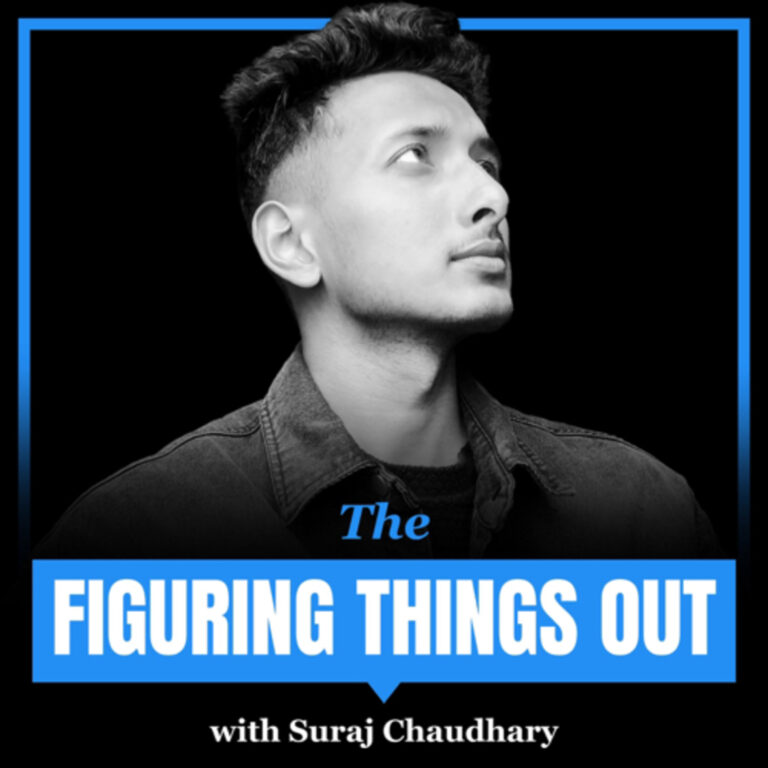
One lesson, thought, or resource to living a fuller life every week. Some bonus episodes here and there.
Suraj Chaudhary is a writer, developer, founder, and a constant learner. He shares lessons and resource to living a fuller life every week.
In this episode, I talk about game selection. About how we are often opted into games by default and most of us don't even think about or realize it.
Game selection is the key to a fulfilled life. Spend more time selecting the games that you want to play and less time playing the games that everyone else is playing.
Suraj Chaudhary is a writer, developer, founder, and a constant learner. He shares lessons and resources for living a fuller life every week.
Join figuring things out: surajc.com

Dear reader,
A few days ago, I met an old friend, let’s call him Alex.
Alex is this incredibly talented guy who’s well-connected everywhere, has a good knowledge of a lot of fields, and is always attending and participating in events and conferences.
He’s also a reader of my articles. (Hi Alex!)
Whenever I meet him, I often feel inadequate.
I feel like:
“This guy is so good, he knows everyone, he knows so many things. Damn! Why am I not as good as him? Maybe I should work on becoming like him.”
For the past many years, that thought was followed by at least a week of feeling inadequate.
Recently, however, I read a piece that said along the lines of:
“Most of the misery I see around me is driven by running someone else’s race.”
More often than not, we opt into games by default.
We opt into games that we think will make us impressive.
We think, “If I just became like this or if I just achieved this, I will be happy and fulfilled.”
But that just isn’t the case.
Let me give you an example:
When we are young, we are, by default, opted into society’s game and are provided an arbitrary timeline:
- You have to complete your high school at 18.
- Get a college degree by 22.
- Get a job at a certain age.
- Get married before 30.
- Have kids by a certain time.
- Get promoted.
- Own a house by a certain time.
- Get a car by a certain time.
…and the list continues.
But all of this is designed to make us run someone else’s race and at their pace, not our own.
It is designed to make us focus on the outside things that are not really in our control.
Most of us don’t even think about this.
We just continue to do whatever society expects us to do, and often have existential crisis.
What we should be thinking about is:
- How can I surround myself with great people that lift me up?
- How can I learn and get better at the things that I love to do?
- What do I love? What are the games that I actually want to play?
Game selection is the key.
Before it’s too late, I urge you to think about the things you’re doing, the games you’re playing, the areas you’re putting your effort in.
I think if you spend more time thinking about game selection, and less time playing the games everyone else is playing, you’d be much better off.
If I had understood this sooner, it would’ve saved me a whole of challenges and misery along the way.
Ask yourself: Am I running my own race? Or am I running someone else’s race—a race that someone else defined for me or a race that someone is expecting me to run?
Because if you’re running someone else’s race, you’re eventually going to burn out or go through a whole lot of misery.
I urge you to think about this.
If you don’t, one day you’ll wake up and be like: “Holy shit! I lived someone else’s life.”
Don’t waste your one chance at life running someone else’s race.
I, too, will focus on the things that I truly want to do, the things that I value, and the things that are important to me.
I will not be swayed into running Alex’s race just because that’s impressive.
I know what my race is, I’ll run that.
Here’s what I want you to learn from this week’s article:
Takeaway: Don’t opt into a game just because someone else is playing it or just because that’s the game everyone plays. Ask yourself: Do I really want to play this game? What do I really want to do? Once you find that out, play your own game, run your own race.
This week’s question for you: How often do you find yourself starting to do something just because someone else is doing it?
I’ll write again next week.
See you then!
Warmly,
Suraj

